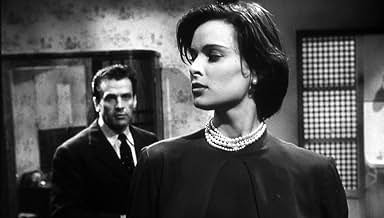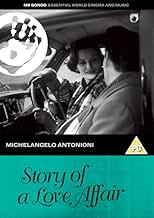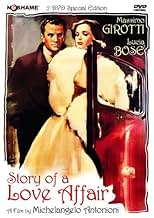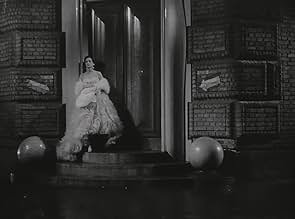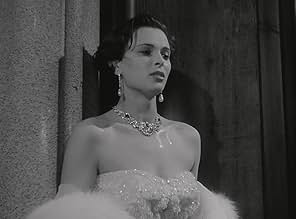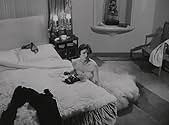IMDb RATING
7.1/10
3.7K
YOUR RATING
Paola is a young, beautiful woman married to a wealthy entrepreneur. She meets her former lover Guido after seven years, but their relationship is marked by tragic events.Paola is a young, beautiful woman married to a wealthy entrepreneur. She meets her former lover Guido after seven years, but their relationship is marked by tragic events.Paola is a young, beautiful woman married to a wealthy entrepreneur. She meets her former lover Guido after seven years, but their relationship is marked by tragic events.
- Awards
- 2 wins & 1 nomination total
Rubi Dalma
- L'amica snob di Paola
- (as Rubi D'Alma)
Rosi Mirafiore
- La cameriera del bar
- (as Rosi Mirafiori)
Featured reviews
This is Antonioni's first feature. Released in 1950, it seems to me both a harbinger of the auturer's mature style while also being a semi- remake, semi- rebuke of Double Indemnity., from only a few years prior. .
There is an extraordinary shot in this film, pure Antonioni, when the lovers meet on a bridge. The view is 360 degrees, we're not sympathizing with one lover more than the other. As the camera moves around its axis, our focus goes much beyond our traditionally intended targets as ship workers in the distance cohabitate the deepest focus with the characters we are following, who bicker over the merits of violating social morality.
If Double Indemnity is fatalistic, this work is nihilistic. If traditional Noir-narrative leads to certain doom, this story leads to only one finality, and that is the randomness and chaos of life, death and love. In that way, this work reminded me most of Woody Allen's late- career "thrillers"-Match Point and Cassandra's Dream.
There is an extraordinary shot in this film, pure Antonioni, when the lovers meet on a bridge. The view is 360 degrees, we're not sympathizing with one lover more than the other. As the camera moves around its axis, our focus goes much beyond our traditionally intended targets as ship workers in the distance cohabitate the deepest focus with the characters we are following, who bicker over the merits of violating social morality.
If Double Indemnity is fatalistic, this work is nihilistic. If traditional Noir-narrative leads to certain doom, this story leads to only one finality, and that is the randomness and chaos of life, death and love. In that way, this work reminded me most of Woody Allen's late- career "thrillers"-Match Point and Cassandra's Dream.
10andrabem
"Cronaca di un amore" was Antonioni's first full-length film. It's a romantic film noir, full of passion, but very far from the Hollywood saccharine romanticism.
It begins almost as a police film: an investigation is being led about Paola Molon. A detective is walking around, asking questions about her.
Seven years ago, Paola (Lucia Bosé) was in love with Guido (Massimo Girotti). Guido was engaged to Paola's best female friend, but there was already love between Guido and Paola. Still, one day a tragic accident happens. And this accident will tear Guido and Paola apart. And now this investigation will reunite them again. Their love is rekindled.
Paola is now married to a wealthy entrepreneur, lives in a mansion, has servants, a car with chauffeur etc.., but Guido' life has been a constant struggle to make ends meet. (Remember that we are in 1950, some years after the end of the war, and Italy was still far away from her economic boom).....
"Cronaca di un amore" shows already Antonioni as an accomplished master. His eye for small details be it in interior or exterior scenes, his ability in directing actors, his sensitive use of land and cityscape - all these qualities are displayed in full force in the film.
Lucia Bosé is an outstanding actress - she is able to portray intense and contradictory emotions just by her facial expressions. Her acting is subtle and powerful. She's a real diva. Giovanni Fusco's soundtrack is a perfect companion to Antonioni's images.
"Cronaca di un amore" is a very beautiful film.
It begins almost as a police film: an investigation is being led about Paola Molon. A detective is walking around, asking questions about her.
Seven years ago, Paola (Lucia Bosé) was in love with Guido (Massimo Girotti). Guido was engaged to Paola's best female friend, but there was already love between Guido and Paola. Still, one day a tragic accident happens. And this accident will tear Guido and Paola apart. And now this investigation will reunite them again. Their love is rekindled.
Paola is now married to a wealthy entrepreneur, lives in a mansion, has servants, a car with chauffeur etc.., but Guido' life has been a constant struggle to make ends meet. (Remember that we are in 1950, some years after the end of the war, and Italy was still far away from her economic boom).....
"Cronaca di un amore" shows already Antonioni as an accomplished master. His eye for small details be it in interior or exterior scenes, his ability in directing actors, his sensitive use of land and cityscape - all these qualities are displayed in full force in the film.
Lucia Bosé is an outstanding actress - she is able to portray intense and contradictory emotions just by her facial expressions. Her acting is subtle and powerful. She's a real diva. Giovanni Fusco's soundtrack is a perfect companion to Antonioni's images.
"Cronaca di un amore" is a very beautiful film.
The very first feature film of Michelangelo Antonioni, Story of a Love Affair as introduced by Lorenzo Codelli, was a film that dealt with the metaphysics, and had very little neo-realist elements which was a departure from what one would come to expect from a filmmaker whose documentaries were neo-realist. Watching it for the first time, I thought it would make a wonderful thriller/crime-mystery involving two lovers, and I suppose in the hands of Hollywood, we would get just that.
But this is not Hollywood we're talking about, so again I get to throw all standard notions I was weaned on out of the window. As I was warned by a friend, I would be in for a rough ride because whatever structure of story-telling I was familiar with was going to be challenged, and strangely enough, I am beginning to find this challenge quite liberating, like the hitting onto a goldmine or an oilfield, and just raking in the sights and sounds from how beautiful a black and white movie could be, in terms of story, and characters.
However, the characters need not be goody-two-shoes, or perfectly looking beings with zilch problems that they couldn't take care of within 2 hours. There are some serious and complex issues that the leads here have to grapple with, and together with an audience, we try and probe, and discover for ourselves just what those are, though naturally we aren't given all the answers on a sliver platter, and have to work hard at it, sometimes even utilizing some precious moments to breathe, digest, and compute, only being able to scratch the surface.
Whatever the story or mystery is, it never really got addressed, not directly anyway. But story aside, I was really intrigued by the lead characters. We have a beautiful married woman Paola Fontana (played by Lucia Bose whom we'll see later in another Antonioni movie, and at one time the reigning Miss Italy) who seem to have the best of what luxuries life can offer, but is stuck in a loveless marriage to a rich man Enrico (Ferdinando Sarmi). We're told that in her youth, she was a head turner, and almost always changes her boyfriends, each being the alpha-male type.
Surprisingly, her lover whom she maintains contact with, Guido (Massimo Girotti) is anything but an alpha-male type. In fact, I would call him a loser in the classic sense of the word. No real job and penniless, he has some magnetic qualities to be be able to mesmerize Paola into trysts in cheap motel rooms. Meeting on the sly, we see how a high society woman have to dodge around from being discovered, and setting up alibis just to meet Guido, and we soon learn how wicked a woman she can be, for coming up with plans for crime to be committed to get things done her way. Which brings us back to the original thought of how she was involved in a more heinous crime / accident, where she could well be the chief manipulator then made to be seen as the victim.
The main crime thread that got weaved into the story, was one involving a certain unseen Ms Giovanna, whose demise was linked to the two lovers. We never really learned what exactly happened, and Antonioni makes us work in order to try and piece clues and accounts together. And the probing of this mystery by a private investigator serves as a catalyst to the rest of the story, where we first see our lovers meet after a long while, but instead of enjoying each other's embrace, seem a lot more concerned with the PI's probe, as if afraid that it'll uncover hidden skeletons in their closets.
Story of a Love Affair becomes an examination into these 2 characters, and interesting enough, to dwell on the problems that they face, in a somewhat lose-lose situation throughout their relationship. The first was when Giovanna served to be in the way of their coming together, being an in-between, and when that's settled, there's the other more pressing issue of whether they can elope successfully, where pragmatism takes over romanticism with Guido knowing for sure that he has no money, and little means to support both of them, especially the lifestyle that Paola currently enjoys.
Definitely deserves a second viewing to try and develop my thoughts on it further! And to enjoy the beautiful score all over again too!
But this is not Hollywood we're talking about, so again I get to throw all standard notions I was weaned on out of the window. As I was warned by a friend, I would be in for a rough ride because whatever structure of story-telling I was familiar with was going to be challenged, and strangely enough, I am beginning to find this challenge quite liberating, like the hitting onto a goldmine or an oilfield, and just raking in the sights and sounds from how beautiful a black and white movie could be, in terms of story, and characters.
However, the characters need not be goody-two-shoes, or perfectly looking beings with zilch problems that they couldn't take care of within 2 hours. There are some serious and complex issues that the leads here have to grapple with, and together with an audience, we try and probe, and discover for ourselves just what those are, though naturally we aren't given all the answers on a sliver platter, and have to work hard at it, sometimes even utilizing some precious moments to breathe, digest, and compute, only being able to scratch the surface.
Whatever the story or mystery is, it never really got addressed, not directly anyway. But story aside, I was really intrigued by the lead characters. We have a beautiful married woman Paola Fontana (played by Lucia Bose whom we'll see later in another Antonioni movie, and at one time the reigning Miss Italy) who seem to have the best of what luxuries life can offer, but is stuck in a loveless marriage to a rich man Enrico (Ferdinando Sarmi). We're told that in her youth, she was a head turner, and almost always changes her boyfriends, each being the alpha-male type.
Surprisingly, her lover whom she maintains contact with, Guido (Massimo Girotti) is anything but an alpha-male type. In fact, I would call him a loser in the classic sense of the word. No real job and penniless, he has some magnetic qualities to be be able to mesmerize Paola into trysts in cheap motel rooms. Meeting on the sly, we see how a high society woman have to dodge around from being discovered, and setting up alibis just to meet Guido, and we soon learn how wicked a woman she can be, for coming up with plans for crime to be committed to get things done her way. Which brings us back to the original thought of how she was involved in a more heinous crime / accident, where she could well be the chief manipulator then made to be seen as the victim.
The main crime thread that got weaved into the story, was one involving a certain unseen Ms Giovanna, whose demise was linked to the two lovers. We never really learned what exactly happened, and Antonioni makes us work in order to try and piece clues and accounts together. And the probing of this mystery by a private investigator serves as a catalyst to the rest of the story, where we first see our lovers meet after a long while, but instead of enjoying each other's embrace, seem a lot more concerned with the PI's probe, as if afraid that it'll uncover hidden skeletons in their closets.
Story of a Love Affair becomes an examination into these 2 characters, and interesting enough, to dwell on the problems that they face, in a somewhat lose-lose situation throughout their relationship. The first was when Giovanna served to be in the way of their coming together, being an in-between, and when that's settled, there's the other more pressing issue of whether they can elope successfully, where pragmatism takes over romanticism with Guido knowing for sure that he has no money, and little means to support both of them, especially the lifestyle that Paola currently enjoys.
Definitely deserves a second viewing to try and develop my thoughts on it further! And to enjoy the beautiful score all over again too!
A rich older man's belated desire to investigate his beautiful wilful young wife' mysterious past reignites old passions with tragic consequences. For those viewers who are uncertain of Antonioni's capacity to make enjoyably great films, this may be a revelation especially if you have a penchant for post-WW2 film noir with its attendant malaise and melancholia. With suitable B&W photography and accompanying musical score and boasting one of the screen's great beauties, Lucia Bose, in her prime, this film is a masterpiece.
To date, there are 13 reviews of this film. Perhaps all the writers saw this movie theatrically. I have the Bo-ying version of USA'a NoShame DVD, and, to say the least, it certainly ranks as the most extraordinary DVD I've ever seen in my life! Presumably, as the original negative was destroyed in a fire in 1989, this DVD has been reconstructed from bits and pieces of the original Italian version and the dubbed English-language version, and then re-sub-titled. A huge effort has been made to make the LOOK of the film consistent -- even when the version used changes -- which it OFTEN does -- right in the middle of a scene! And would you believe that -- with this direct comparison facing us every couple of minutes -- the English-language version is actually superior to the original Italian. The acting is superior and even the syncing is better. (As most of you know, all Italian films are post-dubbed -- and not necessarily by the original actors). But that's not the end of the matter. The sub-titles we see with our eyes often don't fully agree with what we hear with our ears. In at least two cases, the sub-titles (presumably based on the Italian version) are the exact opposite to what we actually hear! And many of the titles also carry extra (rather than less) information. As for the movie itself, I loved it! Beautifully photographed, exquisitely acted, and most engagingly directed. Until now, I was not an Antonioni fan. But anyone who loves streetcars is a friend forever. And there are more streetcars in "Story of a Love Affair" than in any other movie I can think of, except Bunuel's wonderful 1953 homage, "Illusion Travels by Streetcar".
Did you know
- TriviaMichelangelo Antonioni's feature film directorial debut. He wanted to cast Gene Tierney as Paola, but since he was an unknown European director he could not get her. Eventually he met then 19 year old Lucia Bosè, who had been Miss Italy 1947, while having lunch at fellow director Luchino Visconti's house. While initially skeptical over her maturity, Visconti convinced him to audition her.
- GoofsAfter Paola says, "Leave me alone," the camera moves to follow her as she collapses onto her bed. In the upper right corner of the frame, a white drape can be briefly seen before it is pulled out of the path of the camera.
- ConnectionsFeatured in Les films de Marco Ferreri (2008)
- How long is Story of a Love Affair?Powered by Alexa
Details
Box office
- Gross worldwide
- $528
- Runtime1 hour 38 minutes
- Color
- Aspect ratio
- 1.37 : 1
Contribute to this page
Suggest an edit or add missing content



